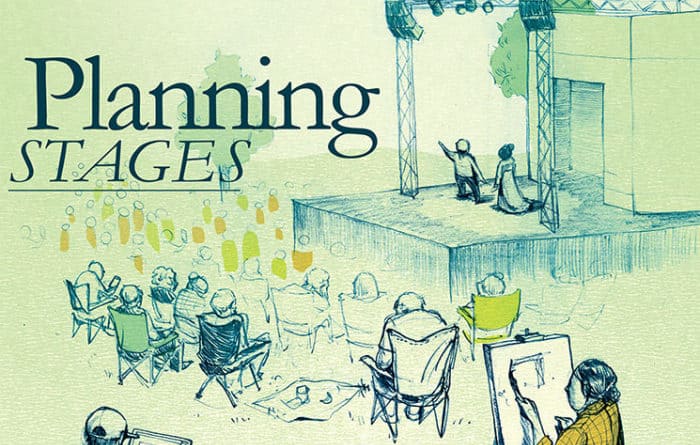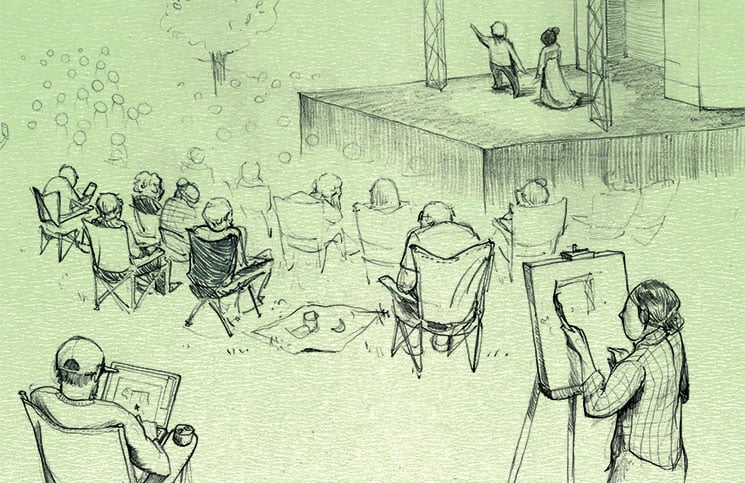When it comes to marketing itself as a destination, Portsmouth is one of the best, according to Scott Ruffner. It’s “up there with any city in the country in terms of being geniuses at leveraging this perceived image of the city as a beacon of culture and arts and artists,” he says.
For Ruffner, a musician, real-estate agent, and founder of the nonprofit Arts Industry Alliance (AIA), that’s where the disconnect comes in. The arts are big business in Portsmouth and the Seacoast — a 2012 survey by Americans for the Arts found that the greater Portsmouth area generated $41.4 million in economic activity in the 2010-2011 fiscal year — but artists are rarely the ones calling the shots or reaping the profits, Ruffner says.
“There’s a lot of support here for the arts from a monetary standpoint, but a huge disconnect between the people in the community producing the art and music … and what is actually being done with all that money,” he says.
As Portsmouth and the Seacoast grow, so does the area’s reputation as an arts destination. That reputation has fueled demand for improvements at some of Portsmouth’s biggest cultural institutions, including a proposed new stage for the Prescott Park Arts Festival and plans for streetscape improvements and a way-finding arch on Chestnut Street in front of The Music Hall.
It’s also fueled plenty of debate. There have been ongoing dialogues — sometimes civil, sometimes heated — about Art-Speak’s “A Tiny Bit Huge” campaign; 3S Artspace founder Chris Greiner’s departure from the organization, and many other topics.
Ten to 20 years ago, these projects, proposals, and changes might have passed by without much comment. But, in a city and region where locals feel like they’re getting priced out and some creative people feel like they have no voice, the debates have grown more contentious and the conversations less constructive.
Who are the arts for?
Mike Teixeira, president of Art-Speak’s board of directors, thinks online debates tend to be more hostile than in-person conversations.
“We’re a little more in our own camps and behind the safety of our keyboards (online), and we say what’s on our minds,” Teixeira says. “Couple that with something that’s near and dear to your heart,” and the results are perfect for angry debates.
Other anxieties are at play, according to Teixeira. Resources are drying up, audiences are getting smaller, there are fewer opportunities for arts funding, and making a go of it in the arts world is more difficult than ever.
“And that anxiety turns quickly into, ‘I’m a real artist, and they’re not a real artist,’” Teixeira says. “Affordable housing on top of all that leads to these blanket assumptions of who should be in the city and who shouldn’t be in the city.”
In some cases, though, it’s a question of who the arts and arts venues are for. Are they catering to locals or tourists? Are they supporting local artists and musicians, or nationally recognized touring acts?
“We live in an era that thrives on controversy, and I think there’s just … an amount of hostility in the airways right now in the social-media sphere.” — Music Hall executive director Patricia Lynch
The Music Hall announced its plans for streetscape improvements and an archway on Chestnut Street in late March. The project, a partnership between the venue and the city, would build new sidewalks on Chestnut Street, improve drainage, create new granite seating walls, and bury utility lines. The $800,000 project would be paid for with $400,000 from the venue’s capital campaign and $400,000 from the city’s capital improvement budget and Urban Development Action Grant funds. The Music Hall would also launch a capital campaign to fund construction of the archway. City officials are currently reviewing the proposal.
The venue’s announcement came around the same time as another announcement: After 29 years, The Music Hall would no longer host the Great Bay Academy of Dance’s annual performance of “The Nutcracker.” The two issues became intertwined in online debates, with supporters of GBAD and others criticizing the streetscape project.
Patricia Lynch, executive director of The Music Hall, says that much of the criticism was based on misconceptions about the project.
“We live in an era that thrives on controversy, and I think there’s just … an amount of hostility in the airways right now in the social-media sphere,” she says.
The decision to end hosting GBAD’s production of “The Nutcracker” was an entirely separate business decision from the streetscape plans, according to Lynch. It was a decision “made for multiple reasons … sustainability, good working conditions for our crew,” and so on, she says.
As for criticisms that The Music Hall isn’t doing enough to support local artists, Lynch says that’s not the case.
“In The Music Hall Loft, we just featured a whole panel about ‘The Witch,’ and the filmmaker, who is local, was there this weekend. … We just had the Soggy Po’ Boys open at the big hall, and Juston McKinney does a couple of shows here,” she says. “When you think about what our mission is, it’s to bring world-class arts and culture to the Seacoast. And there are multiple venues that are doing that important work with local artists.”
But Ruffner thinks larger venues like The Music Hall should be doing more to get local acts on stage.
“As the town grows and keeps doubling down on that image of being a cultural beacon of the Seacoast … they’re going to have to come back around and have something that speaks for the community,” he says.
Who belongs?
Also driving the debates is the question of who the city and the Seacoast are for. Housing prices in Portsmouth, and median incomes, are rising, and a city once known for being a gritty, working-class port is now better known for high-priced condos. It’s a conflict that’s played out visibly in the South End, where a proposal for a new permanent stage for the Prescott Park Arts Festival has been effectively put on hold, according to PPAF board president Jameson French.
“… a very vocal minority should not be able to control the destiny (of the Prescott Park Arts Festival)” — PPAF board president Jameson French
French says that because South End resident Beth Margeson has filed a complaint with the state attorney general’s office stating that plans for the stage run counter to the wishes laid out in Josie Prescott’s trust, the project is delayed and could need to be redesigned.
Complaints about noise in the park are a recent development, French says. He has lived in the South End since 1978. Before the park was established and the arts festival began producing shows some four decades ago, there were fuel storage areas and trucks traveling through the neighborhood. The Portsmouth Naval Shipyard was noisier, and planes took off from Pease Air Force Base every morning at 4:30 a.m.
The neighborhood, he says, has always been busy. And events at the park now are on par with events held in the 1970s and 1980s.
“People often define things and don’t think of the quiet, normal day at Prescott Park. They think of the extreme, the headliner events in the summer that attract a few thousand people,” he says. “But the bulk of events is a family play, or a couple of folk singers, or a movie on a Monday night. These are things that have been going on 43 years. They haven’t changed at all.”
But the residents in the neighborhood have changed, according to French, and a handful of complaints about noise have set the overall tone for the debate.
“We have to listen and we have to try and understand where they’re coming from,” he says. “At the same time … a very vocal minority should not be able to control the destiny” of the festival.
Talking it out
It’s unlikely that the core questions in the debates will be settled soon. Both Teixeira and Ruffner agree that keeping the conversations going is important. For his part, Teixeira would like to see artists, venues, and others work collaboratively and present a “unified front” to make it easier to gather resources and audiences.
“It’s a tough business. If we don’t figure out how to get productive and work together … we’re always going to stay helpless and not achieve anything,” he says.
Ruffner, meanwhile, wants to keep the emphasis on artists. AIA has already had success convincing the Bank of New Hampshire Pavilion in Gilford to stop asking regional artists to perform for free.
“It’s not so much that anybody has ill intent, it’s just that there’s not much of an acknowledgement that there’s a lot of talent that, if it had the proper backing, could do the same kinds of things the restaurant industry or the craft brew industry has done (in the Seacoast),” Ruffner says. “I don’t see why music can’t be any different.”


